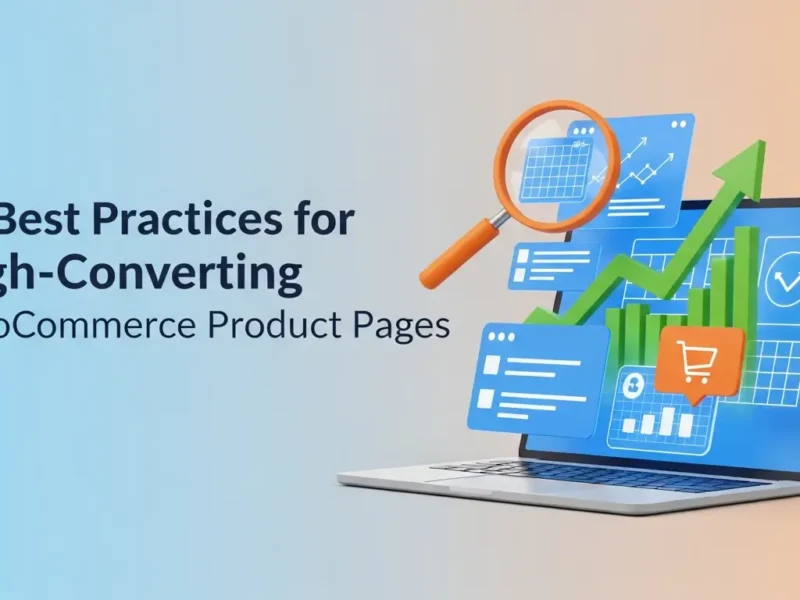In today’s competitive e-commerce landscape, simply having an online store isn’t enough. To truly thrive, your WooCommerce shop needs to offer a seamless, feature-rich, and user-friendly experience that keeps customers coming back. While WooCommerce itself is a powerful and flexible platform, its true potential is unlocked through the strategic use of WooCommerce plugins. These extensions empower you to add advanced functionalities, streamline operations, enhance user experience, and ultimately, boost your sales and conversion rates. If you’re looking to elevate your online store, partnering with a professional WooCommerce development agency can provide the expertise to integrate these plugins seamlessly and ensure optimal performance.
This comprehensive guide will delve into the world of WooCommerce plugins for enhanced functionality, highlighting the top five essential tools that can transform your online store. We’ll explore their benefits, key features, and how they contribute to a more robust and profitable e-commerce business.
Why WooCommerce Plugins Are Indispensable for Your Online Store
Before we dive into our top picks, let’s understand why investing in the right WooCommerce extensions is crucial for your e-commerce success:
- Expanded Functionality: WooCommerce, while robust, has a core set of features. Plugins allow you to extend this functionality significantly, adding anything from advanced shipping options to sophisticated marketing tools.
- Improved User Experience (UX): A smooth and intuitive shopping journey is paramount. Plugins can simplify checkout processes, offer personalized recommendations, enable wishlists, and provide better customer support, all contributing to a superior UX.
- Increased Conversions and Sales: Features like abandoned cart recovery, dynamic pricing, and upsells/cross-sells, often delivered through plugins, directly impact your bottom line by encouraging more purchases.
- Streamlined Operations: Automate tasks like order management, invoicing, and shipping label generation, freeing up your time to focus on growth strategies.
- Enhanced SEO Capabilities: Many plugins are specifically designed to optimize your WooCommerce store for search engines, helping your products rank higher and attract more organic traffic.
- Scalability: As your business grows, plugins allow you to add new features and handle increasing demands without needing to rebuild your entire store.
- Cost-Effectiveness: Often, purchasing a plugin is far more economical than developing custom solutions for specific functionalities.
Now, let’s explore the top 5 WooCommerce plugins that stand out for their ability to enhance your store’s functionality and drive tangible results.
The Top 5 WooCommerce Plugins for Enhanced Functionality
Choosing the right plugins can be overwhelming, given the vast number available. We’ve curated a list of five categories that represent fundamental improvements for almost any WooCommerce store, along with examples of popular and highly effective plugins within each category.
1. Payment Gateway Plugins
The default WooCommerce setup might offer limited payment options, potentially alienating customers who prefer diverse methods. Slow or insecure payment processes can lead to high cart abandonment rates.
Benefits: Payment gateway plugins are fundamental for any e-commerce store. They enable you to accept a wide range of payment methods, from credit cards and digital wallets to local payment solutions, catering to a global customer base. Secure and efficient payment processing builds trust and reduces cart abandonment.
Key Features to Look For:
- Multiple Payment Options: Support for major credit cards (Visa, Mastercard, Amex), PayPal, Stripe, Apple Pay, Google Pay, and regional payment methods.
- Security (PCI Compliance): Ensures secure handling of sensitive customer financial data.
- Fast Checkout: Streamlined processes to minimize friction during payment.
- Recurring Payments (for subscriptions): Essential for businesses offering subscription boxes, memberships, or services.
- Multi-currency Support: Allows customers to view and pay in their local currency, enhancing the international shopping experience.
Popular Examples:
- WooCommerce PayPal Payments: A widely trusted and secure option for accepting PayPal and credit/debit card payments directly on your site.
- WooCommerce Stripe Payment Gateway: Offers a comprehensive suite of payment options, including credit cards, Apple Pay, Google Pay, and more, known for its developer-friendly API and robust features.
2. SEO Plugins
While WooCommerce is built on WordPress, which is inherently SEO-friendly, specific e-commerce SEO challenges exist, such as optimizing product pages, handling duplicate content, and generating schema markup. Without proper SEO, your products will struggle to appear in search results.
Benefits: An SEO plugin is indispensable for improving your store’s visibility in search engine results pages (SERPs). By optimizing product pages, categories, and other content, you can attract more organic traffic, which is often the most valuable and cost-effective source of customers.
Key Features to Look For:
- On-Page SEO Optimization: Tools for optimizing product titles, descriptions, meta descriptions, and slugs.
- Schema Markup (Structured Data): Automatically adds product, review, and other schema markup to help search engines understand your content and display rich snippets in results.
- XML Sitemaps: Generates and updates sitemaps, making it easier for search engines to crawl and index your site.
- Breadcrumb Navigation: Improves user navigation and provides clear pathways for search engines.
- Duplicate Content Prevention: Helps address common e-commerce SEO issues like duplicate content created by product variations.
- SEO Analysis: Provides insights and recommendations for improving your content’s SEO.
Popular Examples:
- Yoast WooCommerce SEO: An extension of the highly popular Yoast SEO plugin, specifically tailored for WooCommerce. It helps optimize product pages, includes schema markup, and addresses e-commerce-specific SEO challenges.
- All in One SEO (AIOSEO) for WordPress & WooCommerce: Another comprehensive SEO solution with a dedicated WooCommerce module, offering features like advanced schema generation, local SEO, and a robust redirection manager.
3. Marketing & Conversion Optimization Plugins
Attracting visitors is only half the battle; converting them into paying customers requires strategic marketing and optimization. Issues like abandoned carts, lack of urgency, or difficulty in finding relevant products can hinder conversions.
Benefits: These plugins are designed to increase your conversion rates by engaging customers, personalizing their shopping experience, and encouraging purchases. From email marketing integration to dynamic pricing and review management, they are crucial for driving sales.
Key Features to Look For:
- Abandoned Cart Recovery: Automatically sends follow-up emails to customers who leave items in their cart.
- Upsells and Cross-sells: Recommends related or upgraded products to increase average order value.
- Product Reviews and Ratings: Collects and displays customer reviews, building trust and social proof.
- Pop-ups and Exit-Intent Offers: Captures attention and provides incentives for purchase.
- Dynamic Pricing and Discounts: Allows for flexible pricing rules, bulk discounts, and personalized offers.
- Email Marketing Integration: Seamlessly connects your store with email marketing platforms for automated campaigns.
Popular Examples:
- CartFlows: A powerful sales funnel builder that helps you create optimized checkout flows, upsells, order bumps, and custom thank you pages, significantly boosting conversions.
- WooCommerce Discount Rules: Enables you to set up various types of discounts, including percentage-based, quantity-based, and conditional discounts, to incentivize purchases and drive sales.
4. Shipping & Logistics Plugins
Managing shipping rates, delivery options, and order fulfillment can be a complex and time-consuming process. Inaccurate shipping calculations or limited delivery choices can frustrate customers and lead to abandoned carts.
Benefits: Efficient shipping and logistics are critical for customer satisfaction and repeat business. These plugins automate shipping calculations, offer various delivery methods, and streamline the fulfillment process, ensuring products reach your customers smoothly and cost-effectively.
Key Features to Look For:
- Real-time Shipping Rates: Integrates with major carriers (UPS, FedEx, USPS, DHL) to provide accurate shipping costs based on location, weight, and dimensions.
- Table Rate Shipping: Allows you to define complex shipping rules based on factors like product weight, quantity, destination, and price.
- Local Pickup Options: Provides flexibility for local customers to pick up orders directly.
- Shipping Label Generation: Automates the creation and printing of shipping labels.
- Order Tracking: Enables customers to track their orders in real-time, reducing customer service inquiries.
- Delivery Date and Time Selection: Gives customers control over when they receive their orders.
Popular Examples:
- WooCommerce Table Rate Shipping: Ideal for stores with complex shipping requirements, allowing you to define highly customizable shipping rules.
- Order Delivery Date for WooCommerce: Empowering customers to choose their preferred delivery date and even time slots, improving convenience and reducing missed deliveries.
5. Product Management & Customization Plugins
Presenting your products effectively and offering customization options can be challenging with basic WooCommerce features. Lack of detailed product views or limited personalization can deter potential buyers.
Benefits: These plugins enhance the way you display and manage your products, making them more appealing and informative for customers. They also allow for greater product customization, which can significantly increase average order value and customer satisfaction. If you require highly bespoke solutions for product presentation or complex configurations, a dedicated WordPress development agency can provide tailored plugin development or integration services.
Key Features to Look For:
- Product Add-Ons: Allows customers to add extra options, such as gift wrapping, engraving, or custom messages, to their purchases.
- Product Variation Swatches: Replaces standard dropdowns for product variations (color, size) with visually appealing swatches.
- Product Image Zoom/Gallery: Provides high-resolution image views and dynamic galleries for a detailed product exploration.
- Quick View: Enables customers to quickly view product details in a pop-up without leaving the category page.
- Custom Product Tabs: Adds extra tabs to product pages for more detailed information like specifications, reviews, or FAQs.
Popular Examples:
- WooCommerce Product Add-Ons: Offers a flexible way to allow customers to personalize products with additional options, often increasing order value.
- YITH WooCommerce Wishlist: While not strictly “product management,” it enhances the product experience by allowing customers to save products for later, which can drive future sales and provide valuable insights into customer interest. It encourages repeat visits and acts as a passive marketing tool.
Choosing the Right WooCommerce Plugins for Your Store
With so many options available, how do you select the best plugins for your specific needs? Consider these factors:
- Identify Your Needs: Before looking for plugins, understand the specific problems you want to solve or the functionalities you want to add. Don’t just install plugins for the sake of it.
- Compatibility: Ensure the plugin is compatible with your current WooCommerce and WordPress versions, as well as your theme and other existing plugins. Incompatibility can lead to site crashes or conflicts.
- Reviews and Ratings: Check user reviews and ratings on the WordPress plugin repository or the developer’s website. Look for plugins with consistently positive feedback.
- Last Updated Date: A recently updated plugin indicates active development and compatibility with the latest WordPress and WooCommerce versions.
- Support and Documentation: Good support and comprehensive documentation are crucial, especially if you encounter issues or need help with configuration.
- Performance Impact: Be mindful of how a plugin might affect your site’s speed. Too many heavy plugins can slow down your site, negatively impacting user experience and SEO. Look for lightweight, optimized solutions.
- Developer Reputation: Choose plugins from reputable developers or companies with a proven track record.
- Cost vs. Value: While many free plugins are excellent, premium plugins often offer more advanced features, dedicated support, and regular updates. Evaluate whether the benefits outweigh the cost.
- Trial and Testing: Whenever possible, test plugins in a staging environment before implementing them on your live website to avoid unforeseen issues.
Conclusion
WooCommerce is an incredibly powerful platform, but its true potential is realized when you strategically leverage the vast ecosystem of plugins. By carefully selecting and implementing the top WooCommerce plugins for enhanced functionality, you can transform your online store into a highly efficient, user-friendly, and conversion-optimized e-commerce powerhouse.
From streamlining payment processes and boosting your search engine rankings to personalizing the customer journey and automating tedious tasks, the right plugins provide the tools you need to compete and thrive in the digital marketplace. Remember to assess your specific business needs, prioritize compatibility and performance, and always choose reputable developers.



